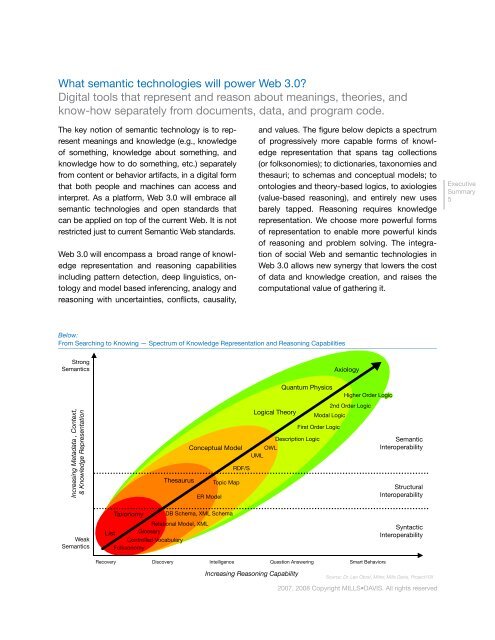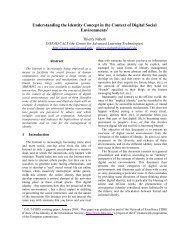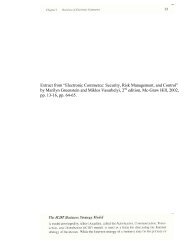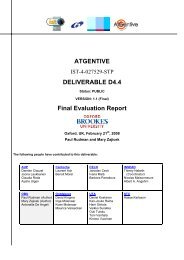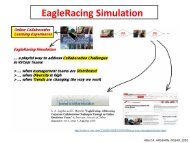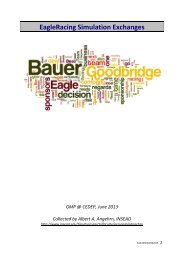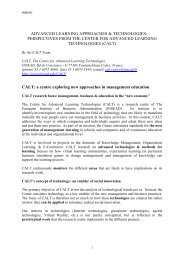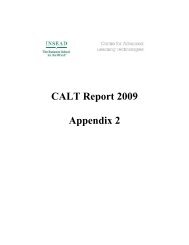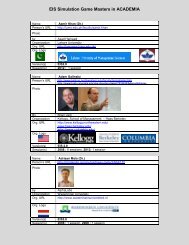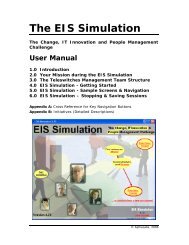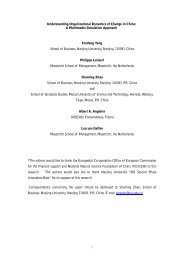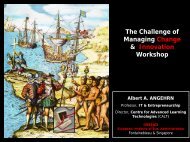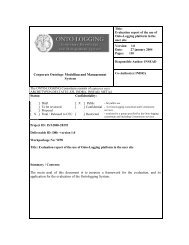Industry Roadmap to Web 3.0 & Multibillion Dollar ... - INSEAD CALT
Industry Roadmap to Web 3.0 & Multibillion Dollar ... - INSEAD CALT
Industry Roadmap to Web 3.0 & Multibillion Dollar ... - INSEAD CALT
You also want an ePaper? Increase the reach of your titles
YUMPU automatically turns print PDFs into web optimized ePapers that Google loves.
What semantic technologies will power <strong>Web</strong> <strong>3.0</strong>?<br />
Digital <strong>to</strong>ols that represent and reason about meanings, theories, and<br />
know-how separately from documents, data, and program code.<br />
The key notion of semantic technology is <strong>to</strong> represent<br />
meanings and knowledge (e.g., knowledge<br />
of something, knowledge about something, and<br />
knowledge how <strong>to</strong> do something, etc.) separately<br />
from content or behavior artifacts, in a digital form<br />
that both people and machines can access and<br />
interpret. As a platform, <strong>Web</strong> <strong>3.0</strong> will embrace all<br />
semantic technologies and open standards that<br />
can be applied on <strong>to</strong>p of the current <strong>Web</strong>. It is not<br />
restricted just <strong>to</strong> current Semantic <strong>Web</strong> standards.<br />
<strong>Web</strong> <strong>3.0</strong> will encompass a broad range of knowledge<br />
representation and reasoning capabilities<br />
including pattern detection, deep linguistics, on<strong>to</strong>logy<br />
and model based inferencing, analogy and<br />
reasoning with uncertainties, conflicts, causality,<br />
and values. The figure below depicts a spectrum<br />
of progressively more capable forms of knowledge<br />
representation that spans tag collections<br />
(or folksonomies); <strong>to</strong> dictionaries, taxonomies and<br />
thesauri; <strong>to</strong> schemas and conceptual models; <strong>to</strong><br />
on<strong>to</strong>logies and theory-based logics, <strong>to</strong> axiologies<br />
(value-based reasoning), and entirely new uses<br />
barely tapped. Reasoning requires knowledge<br />
representation. We choose more powerful forms<br />
of representation <strong>to</strong> enable more powerful kinds<br />
of reasoning and problem solving. The integration<br />
of social <strong>Web</strong> and semantic technologies in<br />
<strong>Web</strong> <strong>3.0</strong> allows new synergy that lowers the cost<br />
of data and knowledge creation, and raises the<br />
computational value of gathering it.<br />
Executive<br />
Summary<br />
5<br />
Below:<br />
From Searching <strong>to</strong> Knowing — Spectrum of Knowledge Representation and Reasoning Capabilities<br />
Strong<br />
Semantics<br />
Axiology<br />
Increasing Metadata , Context,<br />
& Knowledge Representation<br />
Weak<br />
Semantics<br />
Taxonomy<br />
Thesaurus<br />
Relational Model, XML<br />
List Glossary<br />
Controlled Vocabulary<br />
Folksonomy<br />
Conceptual Model<br />
Topic Map<br />
ER Model<br />
DB Schema, XML Schema<br />
DB Schema, XML Schema<br />
RDF/S<br />
Logical Theory<br />
OWL<br />
UML<br />
Quantum Physics<br />
First Order Logic<br />
Description Logic<br />
Higher Order Logic<br />
2nd Order Logic<br />
Modal Logic<br />
Semantic<br />
Interoperability<br />
Structural<br />
Interoperability<br />
Syntactic<br />
Interoperability<br />
Recovery Discovery Intelligence Question Answering Smart Behaviors<br />
Increasing Reasoning Capability<br />
Source: Dr. Leo Obrst, Mitre; Mills Davis, Project10X<br />
2007, 2008 Copyright MILLS•DAVIS. All rights reserved


